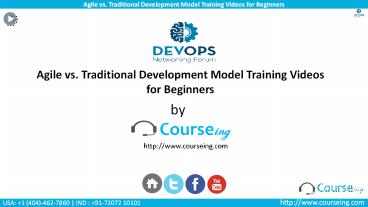DevOps Training Agile vs Traditional Development Model - PowerPoint PPT Presentation
Title:
DevOps Training Agile vs Traditional Development Model
Description:
DevOps Training Agile vs Traditional Development Model covers Agile Introduction, Agile vs water fall model Architecture, Traditional Development Model, Waterfall Model Architecture, Waterfall Model Advantages &Disadvantages,Agile Method, Agile Method Advantages and Disadvantages in clear descriptive manner. To know more about DevOps course visit or visit courseing online training – PowerPoint PPT presentation
Number of Views:217
Title: DevOps Training Agile vs Traditional Development Model
1
Agile vs. Traditional Development Model Training
Videos for Beginners
by
http//www.courseing.com
2
Highlights
- Introduction
- Architecture
- Traditional Development Model
- Waterfall Model Architecture
- Waterfall Model Advantages Disadvantages
- Agile Method
- Agile Method Advantages and Disadvantages
3
Introduction
- Modern software development life cycle
methodology can be subdivided into two types, one
is Agile and other is Traditional process . - Agile Method is a particular approach to project
management that is utilized in software
development. - Assists teams in responding to the
unpredictability of constructing software. - Traditional Development Model is also called as
waterfall model. - Waterfall model is a linear approach to software
development.
4
Architecture
Sources Segue technologies
5
Traditional Development Model
- Traditional Development Model or Waterfall Model
is characterized by a sequential series of step
process, used in software development processes. - This process involves steps like
analysis, design, construction, testing,
production implementation and maintenance. - This definition, planning, building, testing and
deployment flows step by step downwards so it
named as water fall model. - Each of these represents a distinct stage of
software development, and each stage generally
finishes before the next one can begin.
6
Waterfall Model Architecture
Requirements
- .
Product Requirement Document
Design
Software Architecture
Implementation
Software
Verification
Maintenance
7
Waterfall Model Advantages Disadvantages
- Advantages
- Planning and designing more straightforward,
progress is easily measurable. - Software can be designed carefully, by
understanding of all software deliverables. - Customer presence is not strictly required after
the requirements phase. - Disadvantages
- Documenting customer requirements is most
difficult part of software development. - Changes can be difficult to implement.
8
Agile Method
- Agile method proposes incremental and iterative
approach to software design. - It broken into individual models that designers
work on. - It promotes continuous iteration of development
and testing throughout the software development
lifecycle of the project. - Development and testing of software activities
are concurrent. - Every iteration has its own testing phase. It
allows implementing regression testing every time
new functions or logic are released.
9
Agile Method Advantages and Disadvantages
- Advantages
- Development process is iterative, and the project
is executed in short period. - Testers and developers work together. Error can
be fixed in the middle of project. - Customers can frequently check and make changes
to the project. - Disadvantages
- It requires close communication with developers
and together analyze requirement. - It is considered unstructured compared to the
waterfall model.
10
Feedback
Like It ? Hate It?
We would love to hear from you whatever you think
about the course.
Click HERE to share what you think!
11
Thank you
Thank You for Watching Agile vs. Traditional
Development Model Training Videos for Beginner by
http//www.courseing.com































